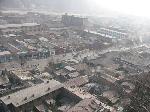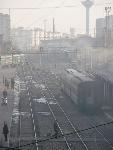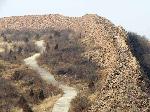- Getting around Lijiang. Dont stay in the Old Towns more than 2 days, there is nothing to do. KRISS Oct 9, 2013 05:46
- 2013 Beijing Temple Fair BENNYLAU Feb 26, 2013 03:29
- Malaysian traveling from KUL - LAX vis Shanghai PVG ZATI_DY Jan 3, 2013 20:15
Through the Smoke – Zhangjiakou
- Views: 3665
- |Vote: 0 0
- |Add to Favorites
- |Recommend to Friends
The Rise and Fall of Zhangjiakou
I’m not sure why I love places that other people hate. People complain that “this place is too dirty”, “that place is too cold”, “another place is too crowded”. But for me, part of my commitment to live in China and learn more about this inexplicable country is that I want to go to every part, and see everything, no matter what other people say. And sometimes, this takes me to cities in China that surprise me.
Zhangjiakou has to be one of those places. Right in the north-western corner of Hebei, it seldom attracts visitors, because it’s not considered pretty enough to entertain tourists with taste. Even the locals I met there were surprised to see a foreigner wandering around the streets – I bought a toffeed banana from one old, grizzly grandpa in a side street, who stared at me incredulously and asked me, “why come to a dirty old place like this?” I answered – because it’s interesting to me. Zhangjiakou, for all it’s broken brick and dusty walkways, is a city that charmed me for its remote and lonely atmosphere of slow decomposition.
It hasn’t always been this way. Zhangjiakou was once an important centre in Imperial times, and even in modern times it briefly served as the capital of Inner Mongolia, before the borders shifted around leaving Zhangjiakou languishing in a backward part of Hebei. Back in the old days, the pass through the Great Wall into Mongolia was here, and anything coming from Beijing through to Mongolia had to squeeze through the mountains via this passageway. The Wall, of course, still passes through the town and this remains one of the most unique parts of the Great Wall to visit that is near enough to be convenient to Beijing.
When the Chinese people began to build their own railroads, this is the first place they chose to connect to. It was that railway line too that the Empress Dowager Ci Xi chose to make her escape when the Nationalist armies overturned the Qing administration. Zhangjiakou must have seemed to her then to be a remarkable enough place for someone of her station to hide, and this was enough for me to want to understand more about this old town.
I’d visited once before – five years ago I spent a very cold and warm-hearted Spring Festival here with a local family, and although I only became familiar with one small district, Xiahua, during that time, my impressions of the place were deep enough to have always wanted to go back. Those misty evenings wandering around coal-heated brick homes and taking in the view from the slopes of the region’s mountains, I developed a strong feeling for Zhangjiakou, as if it were a place I’d have loved to have been born. When the opportunity came to return in 2006, I eagerly took the chance to spend a couple of days getting to know the centre of town and see what attractions, if any, there really still were in this old, forgotten place.
The Capital of Coal
Everything in Zhangjiakou is penetrated by the smoke. Women smoke cigarettes, men sit puffing on pipes and even the rough homesteads smoke coal out through makeshift chimneys. When I arrived back in Zhangjiakou, the first thing that struck me was that familiar smell – I remembered the night I’d spent on the family ‘kang’ – a large wooden bed for the whole family heated by pipes underneath – and the traces of coal in the air that smelt warm and full. Coal is a bad way to heat a community – but for those who have grown up in towns like these, it is a signal of having come home.
Taking the bus from the South Station right to the North Station in central Zhangjiakou (Route 1), I saw clusters of these old houses, puffing the white smoke out into the smog resting on the city’s roofs. Great factories sat ostentatiously along the roadsides of the central streets like palaces. As I approached the heart of Zhangjiakou, I began to realise how far this once-great city has fallen. The faces of the locals were tired and grim with dark and dusty parched skin, and their homes were often in a state of disrepair, of the kind that only comes from not having the enthusiasm to keep up maintenance.
The river that bisects the city is gone – in its place a broad dry channel of mud with a trickle of dirty ice. The taxi driver who took me across to the west side after I’d found a small, inexpensive hostel told me that there will be water back after the completion of a massive engineering project next year – the first news I’d heard that Zhangjiakou was preparing to reanimate itself. I told him that I thought the mountains around the countryside were very beautiful, and he disagreed – “Those scrubby hills? Only fit for mining”. He told me that the mountainous miles around outer Zhangjiakou are now used for soldier training, and also mentioned that below the city are huge caverns built for military purposes with some reportedly impressive military installations. Looking across the bare plains, it was hard to believe.
One thing that was a welcome sight was the view of the Great Wall, trickling along the mountain range to the north of town. From a distance, it didn’t look like it was in healthy shape, and it didn’t seem to greatly resemble the parts of the Wall I’d seen elsewhere – no imposing grey impasses, no crenellated battlements. The watchtowers were like huge dusty barrels made of pottery, and I could make out regions of the Wall that had fallen down entirely. For any Great Wall enthusiast, this was far from a disappointment – indeed, the prospect of investigating genuine, unprettified Great Wall was an attractive thought. The driver told me that the whole length of the Wall around Zhangjiakou is open for tourists, and that the best way to begin would be to visit Da Jing Men, the Mongolian passway itself, which stretches across a main road like an overbridge in the city’s north.
The Attractions
In the north-western corner of the city was a temple called the Shuimu Palace on the map, so I decided to check it out. I had heard that behind the temple was an unusual attraction called the ‘Underground Great Wall’, and I was keen to find out what that could be. Bus number 2 terminates at the gate, and so I wandered past the sign along what seemed to be a farmer’s pathway home until I found the bright red walls that signify old Chinese treasures.
The palace itself seemed to be a monastic community, although the only people I saw wandering through the temple grounds were smoking, stubbly men in black leather jackets, just as I’d seen in the rest of town. It was beautifully set on the lower slopes of a mountain, with the main buildings constructed over a water bridge, through which no longer passed any great deal of water. A pagoda on a man-made lake was also dry. Yet there was nothing ignoble about the palace – somehow, it maintained a dignity in the cool, afternoon air that shushed me to quiet as I passed through, nodding to the Buddhas to keep up the peaceful disposition of the day.
Behind the temple, I took the chance to climb the mountainside as the sun went down. From that distance, Zhangjiakou was a cool haze in the evening light. Much of the space around the city was bare and open, and I was struck at how remote the place appeared, in a country where many of the smaller cities still seem bustling with too many people. Zhangjiakou has lost some of it’s spark, sure, but the city now has an air of sad grace that I found appealing.
I continued the climb until I saw the entrance to the Underground Great Wall – it seemed to be a mere tunnel – but it was getting late, and I had to head back for the city. I walked along the main street outside the temple gates – so dark and quiet, by that time – and felt very happy to be somewhere with enough space to breathe.
In town, the markets were busy, and cheap. Through the misty streets, the night crowds were circulating like the smoke themselves, selecting from the sizzling snacks, batting their gloved hands in the chilly air. The main shopping drag on the west side of the river is surprisingly well-fitted, and it’s really the only part of town that reminded me what century I was in.
In the morning I checked out the Wall – the cheapest section I’ve ever seen, at only 3RMB to enter the tourist facility on Da Jing Men. Only the gate itself is really restored, and as you climb up over the city, the Wall reverts to its centuries old shape – clods of red clay brick piled together in a tall, plain wall. A smooth path thoughtfully laid out along the side of the Great Wall made wandering along its length for a couple of kilometres a very pleasant morning. It was raw and real, and as I smoothed my hand across the jagged bricks I could almost see the labourers of ages gone by hauling loads up the bare mountainside to build it for the first time. Those hills then must have looked as they do now.
I left later that day, not without a feeling of reluctance. Zhangjiakou is an old place, with signs of wear. I won’t lie and say it’s picturesque or beautiful in a traditional sense. But in an untraditional sense – with a mind to appreciate the real-life distant settings that people make into their homes – it has its beauty as a totally human landscape. Zhangjiakou is alone and desolate – but that smouldering coal will keep it warm for a long time yet.






 Copyright © 1998-2024 All rights reserved.
Copyright © 1998-2024 All rights reserved.
1.
May 12, 2007 02:02 Reply
APAULT said:
I am so surprided to read that the air is smokey, my students (in Shijiazhuang) who come from there talk about its clean air! OK I guess I must visit for myself. Maybe next week.
2.
Jan 31, 2006 12:52 Reply
LINK said:
You've sold me. Zhangjiakou sounds like an interesting place to visit. I've noticed some similarities between us. We both seem to fall in love with places that others dislike. I enjoy seeing the real parts of china that haven't been touched by tourists and western influence. Zhangjiakou sounds like one of those cities.